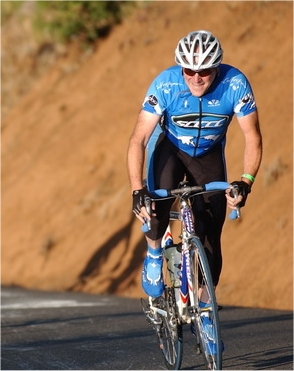It seems these days that everyone has some kind of cool climbing calculator - you've already read about my pretty cool Low Key Hill Climb Converter in a recent post (yeah - like my *last* post!).
Well it seems my beefed-up LKHC Converter spurred on others to see what they could cook up - and the top climber in this year's LKHC series, Tim Clark, came up with something pretty cool himself - what he calls his Climbing Power Calculator (version 0.1) - and here is what he says about it (I could paraphrase it, but Tim did a pretty good job of explaining it in an e-mail to the LKHC e-mail list - I hope you don't mind, Tim!) :
After seeing Steve Rosen's LKHC Climb Prediction page ... I got motivated to try to implement something in Adobe/Macromedia Flex.
Ultimately ... my goal is to have something which is capable of taking your 'Average Threshold Power' ... and applying it to the different (instantaneous) gradients throughout the climb ... hopefully giving you the best possible estimate of your time.
In order to do this ... I implemented the Power Profile spreadsheet that I found - which solves the quadratic equation for your climbing velocity based on a number of parameters (distance, grade, wind, rolling resistance, and POWER).
I also needed to be able to read the MotionBased (exported) XML files, so that I could get access to the Distance vs. Altitude data. I did this on the left 'pane' ... where it displays a plot of the MB data.
At present, it just pulls the (available) climb data for the climbs (I'm still missing a bunch), stuffs values into the Power Calc sheet, and allows you to Predict your Time based on the data. You can fool around with Rider Weight, Equip Weight, Head Wind, Power, etc ... and see how they would affect your times for the various climbs.
It's *FAR* from finished, but I thought I'd share it wit everybody, so that I can get feedback as I continue to fool around with it.
Well, I fooled around with Tim's new Climbing Power Calculator - and it's really pretty good. The main problem I see with his calculator is that it requires you to *know* your average power for a climb! Well, anyone with a power meter (like Tim and countless other more serious cyclists - especially the better racers) have access to this very important power information.
But others of us - me included - don't have power meters (yet!) - so with this in mind, I decided it would be useful to have YACC (Yet Another Climbing Calculator) - but I just call it The Climb Calculator.
So what's the big deal about this one?
Simple - I wanted a generic climb calculator, so I can play those "what if" games for *any* climb that I choose to do. And not just the LKHC climbs that most of us are so familiar with.
Also, what if *you* are convinced the elevation or distance info for one of the LKHC climbs is *wrong*?
Or, what if you think my choice of 50.0 watts of power needed to overcome tire pressure, wind resistance, extra cold weather, a bad hair day, etc. - is simply wrong and should really be 45.321 watts?
This Climb Calculator will feel familiar to you - except you can enter the *exact* height of a climb (in feet), and the *precise* distance (in miles) for that climb.
Then, do the usual - either enter time information (mins:secs) and/or weight information (and notice that you now enter the rider weight and the equipment weight as separate numbers - and it will automatically figure out the total weight - a good idea I saw in Tim Clark's cool calculator). You can also optionally enter in power information, if you have it!.
Note that if you enter in your average power information for a climb (and you don't have to - it will determine your power info from your weight and time, if you want), you can optionally enter in the "extra watts", i.e., that magic number (I use 50.0 for the LKHC Converter) that accounts for all the power you need to "move the bike", as Al Williams pointed out.
And, of course, this Climb Calculator let's you play all those fun "what if" games, by changing the rider weight (or, the equipment weight - or both!) and seeing the change in the climbing time. Or, you can change the average power output for your climb, and see the climbing time get re-calculated, etc.
I did this because I have good data for a lot of the climbs I do - dozens of major climbs, but also dozens of smaller climbs - some that are just a 1/2 mile long or so. Now I can see the effects of weight change or power change on all those climbs.
And, of course, for all those *big* climbs that we do, but have not been done by the LKHC (yet) - like Alba Rd - or Jamison Creek - or the San Bruno HC, etc. - you can now see what happens when you control yourself and stop having those second helpings of lasagna, that extra piece of apple pie, etc. - or do those extra hill repeats in the middle of winter and increase your power output by 2%, etc.
Have fun!
Tuesday, December 18, 2007
Subscribe to:
Post Comments (Atom)

No comments:
Post a Comment